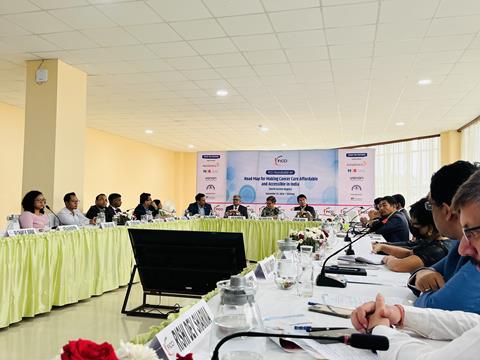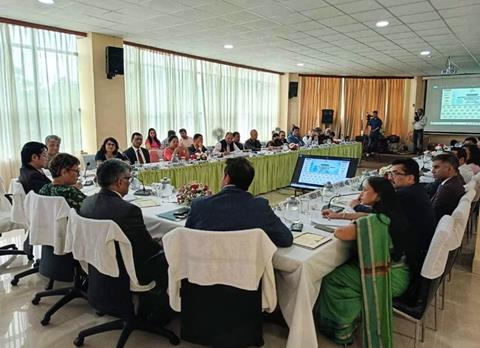Cancer Crisis in the North-East: FICCI Roundtable Sheds Light on Making Cancer Care Affordable and Accessible
Our vision is a cancer-free future generation, where everyone has access to accurate tests and affordable treatment: Dr Mazel Ampareen Lyngdoh, Meghalaya Health Minister.
SHILLONG, 27 September 2024 — The alarming rise in cancer cases, particularly in the North-Eastern region of India, took centre stage at the ‘FICCI Roundtable for the North-Eastern region’, organised under the aegis of the Ministry of Health & Family Welfare, Government of India. The event outlined a roadmap for making cancer care more affordable and accessible in India and brought together key stakeholders from the healthcare industry, government bodies, and non-profit organisations.
region of India, took centre stage at the ‘FICCI Roundtable for the North-Eastern region’, organised under the aegis of the Ministry of Health & Family Welfare, Government of India. The event outlined a roadmap for making cancer care more affordable and accessible in India and brought together key stakeholders from the healthcare industry, government bodies, and non-profit organisations.
Dr. Mazel Ampareen Lyngdoh, the Minister of Health & Family Welfare, Government of Meghalaya, delivered the keynote address, emphasising the gravity of the cancer crisis in the North-East. “Our vision is a cancer-free future generation where everyone has access to accurate tests and affordable cancer treatment,” said Dr. Lyngdoh. She acknowledged that cancer has become a major public health challenge, especially in her region, and stressed the need for collaborative efforts to combat it.
Cancer Surveillance and Technological Leverage
Dr. Lyngdoh highlighted the progress made by the Meghalaya government under the leadership of Chief Minister Conrad Sangma in providing fundamental cancer treatment interventions for its citizens. She noted that cancer surveillance has become a top priority, pointing out that advances in technology could play a crucial role in saving lives. “By leveraging technological advancements, we can save countless lives. This roundtable will help us formulate an achievable policy,” she said, calling for partnerships among stakeholders to tackle the growing cancer burden.
Mission-Based Approach to Cancer Prevention
Mr. Sampath Kumar, Principal Secretary of the Ministry of Health & Family Welfare, Government of Meghalaya, also spoke at the roundtable, calling for a mission-driven approach to address the state’s rising cancer rates. He pointed out that lifestyle choices and certain cultural practices significantly contribute to the cancer burden in Meghalaya, necessitating a robust response. In this regard, he mentioned the Cancer Mission, a screening-based program launched by the government that focuses on early detection and prevention. The initiative has already screened individuals over 30 years of age in the Khasi District, one of the areas most affected by cancer.
In addition to preventive measures, Mr. Kumar highlighted the importance of traditional medicine systems like AYUSH (Ayurveda, Yoga, Unani, Siddha, and Homeopathy) in managing stress and preventing cancer relapses.
FICCI’s Multi-Stakeholder Task Force
Recognising the gravity of the situation, FICCI established a multi-stakeholder Task Force in 2022, specifically aimed at addressing the cancer crisis in India. Mr. Raj Gore, Chair of the FICCI Task Force on Cancer Care and CEO of Healthcare Global Enterprises Limited (HCG), underscored the unique healthcare challenges faced by the North-Eastern states. “High tobacco consumption, inadequate healthcare infrastructure, and delayed diagnosis fuel the alarming rise in cancer cases. Tobacco alone accounts for 57% of cancers in men and 28% in women,” he said, emphasising the need for comprehensive prevention strategies, early detection initiatives, and improved access to cancer treatment, especially in underserved areas.
Towards a Comprehensive Cancer Policy
During the roundtable, several government representatives and industry experts echoed the need for a comprehensive cancer policy. Dr. Joram Beda, Commissioner & Secretary, Department of Health and Family Welfare, Government of Meghalaya, announced that the government is formulating a cancer policy covering treatment protocols, palliative care, and psychological support for patients.
In support of this, Ms. Malti Sachdev, Senior Managing Director at Varian, highlighted the need to make cancer more manageable for patients. She recommended the Hub and Spoke model, already adopted by the Assam Cancer Care Foundation, as a potential solution for improving cancer care across the region. The model aims to provide a centralised hub for specialised cancer care, supported by smaller, more accessible facilities (spokes) in remote areas. Ms. Sachdev also called for increased efforts in capacity building and manpower training to enhance the overall healthcare infrastructure.
Innovations and the Role of AI in Cancer Detection
Another critical area discussed was the role of innovation and technology in advancing cancer care. Mr. Praveen Akkinepally, Business Unit Head for Oncology at AstraZeneca India, highlighted recent advancements in oncology, mainly using artificial intelligence (AI) to detect lung cancer. However, he cautioned that screening and detection are just the first steps. “Screening and detecting cancers will help only when there is follow-through with appropriate diagnosis, treatment, and care,” he stated. Mr. Akkinepally also advocated for the inclusion of specific disease areas under cancer in government insurance schemes, noting that cancer treatments are often prohibitively expensive.
Call for Action: Improving Cancer Care in India
 In partnership with EY, the FICCI Cancer Care Task Force published a report titled “Call for Action: Making Quality Cancer Care More Accessible and Affordable in India.” This report has been shared with relevant healthcare authorities and aims to drive meaningful action. Following this report, FICCI has been organising a series of regional roundtables to gather further input from stakeholders across India. Previous roundtables have been held in Gandhinagar, Bengaluru, Bhubaneswar, and Jaipur. The Shillong event was organised with AstraZeneca, HCG Hospitals, Varian, and the Indian Medical Parliamentarians’ Forum (IMPF). The IMPF played a vital role in coordinating between the Meghalaya government and FICCI to make this event possible.
In partnership with EY, the FICCI Cancer Care Task Force published a report titled “Call for Action: Making Quality Cancer Care More Accessible and Affordable in India.” This report has been shared with relevant healthcare authorities and aims to drive meaningful action. Following this report, FICCI has been organising a series of regional roundtables to gather further input from stakeholders across India. Previous roundtables have been held in Gandhinagar, Bengaluru, Bhubaneswar, and Jaipur. The Shillong event was organised with AstraZeneca, HCG Hospitals, Varian, and the Indian Medical Parliamentarians’ Forum (IMPF). The IMPF played a vital role in coordinating between the Meghalaya government and FICCI to make this event possible.
Cancer Statistics: A Growing Concern
The roundtable brought attention to the stark cancer statistics for the North-East, a region that is disproportionately affected by the disease. According to the National Cancer Registry Program, Manipur recorded a 6.48% increase in cancer cases in 2022, significantly higher than the national average of 2.45%. Other states in the region, such as Sikkim (6.67%), Tripura (3.51%), Mizoram (3.44%), and Meghalaya (2.79%), also saw alarming rises in cancer incidence. Neighbouring states like Nagaland, Assam, and Arunachal Pradesh reported increases of 2.71%, 2.45%, and 2.16%, respectively.
A Collaborative Effort to Combat Cancer
The FICCI Cancer Roundtable in Shillong marked a significant step forward in addressing the growing cancer crisis in the North-East. With contributions from healthcare experts, government officials, and private sector stakeholders, the event underscored the importance of a coordinated, mission-driven approach to combat cancer. By focusing on early detection, prevention, innovation, and accessibility, the discussions set the stage for developing a comprehensive cancer care policy that could serve as a model for the rest of the country. As Dr. Lyngdoh aptly said, “Let’s unite to forge partnerships amongst all stakeholders to battle against cancer.”
